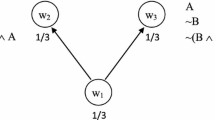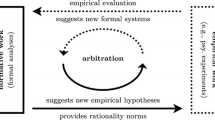Abstract
The Preface Paradox has led many philosophers to believe that, if it isassumed that high probability is necessary for rational acceptability, the principleaccording to which rational acceptability is closed under conjunction (CP)must be abandoned. In this paper we argue that the paradox is far less damaging to CP than is generally believed. We describe how, given certain plausibleassumptions, in a large class of cases in which CP seems to lead tocontradiction, it does not do so after all. A restricted version of CP canthus be maintained.
Similar content being viewed by others
REFERENCES
Achinstein, P.: 2001, The Book of Evidence, Oxford University Press, Oxford.
Appiah, A.: 1985, Assertion and Conditionals, Cambridge University Press, Cambridge.
Carnap, R.:1971, 'A Basic System of Inductive Logic', in R. Carnap and R. Jeffrey (eds), Studies in Inductive Logic and Probability, University of California Press, Berkeley, pp. 33-167.
Castell, P.: 1998, 'A Consistent Restriction of the Principle of Indifference', British Journal for the Philosophy of Science 49, 387-395.
de Finetti, B.: 1937, 'Foresight: Its Logical Laws, Its Subjective Sources', in H. Kyburg Jr. and H. Smokler (eds), Studies in Subjective Probability, Krieger, New York, 1980 (2nd edn.), pp. 53-118.
de Finetti, B.: 1970, Theory of Probability, vol. 2, Wiley, New York.
Douven, I.: 2002a, 'Decision Theory and the Rationality of Further Deliberation', Economics and Philosophy 18, 303-328.
Douven, I.: 2002b, 'A New Solution to the Paradoxes of Rational Acceptability', British Journal for the Philosophy of Science 53, 391-410.
Earman, J.: 1992, Bayes or Bust?, MIT Press, Cambridge, MA.
Ebbinghaus, H. D., J. Flum, and W. Thomas: 1984, Mathematical Logic, Springer, New York.
Edgington, D.: 1995, 'On Conditionals', Mind 104, 235-329.
Edgington, D.: 2001, 'Conditionals', in L. Goble (ed.), The Blackwell Guide to Philosophical Logic, Blackwell, Oxford, pp. 385-414.
Fine, T.: 1973, Theories of Probability, Academic Press, New York.
Foley, R.: 1990, 'Probabilism', in P. French, Th. Uehling Jr., and H. Wettstein (eds), The Philosophy of the Human Sciences (Midwest Studies in Philosophy XV), University of Notre Dame Press, Notre Dame, pp. 114-129.
Foley, R.: 1992, 'The Epistemology of Belief and the Epistemology of Degrees of Belief', American Philosophical Quarterly 29, 111-124.
Friedman, M.: 1983, Foundations of Space-Time Theories, Princeton University Press, Princeton.
Garber, D.: 1983, 'Old Evidence and Logical Omniscience in Bayesian Confirmation Theory', in J. Earman (ed.), Testing Scientific Theories, University of Minnesota Press, Minneapolis, pp. 99-131.
Gillies, D.: 2000, Philosophical Theories of Probability, Routledge, London.
Goosens, W.: 1976, 'A Critique of Epistemic Utilities', in R. Bogdan (ed.), Local Induction, Reidel, Dordrecht, pp. 93-113.
Green, C.: 1992, 'Of Immortal Mythological Beasts: Operationism in Psychology', Theory and Psychology 2, 291-320.
Hájek, A.: 1998, 'Agnosticism Meets Bayesianism', Analysis 58, 199-206.
Hájek, A.: 2003, 'What Conditional Probability Could Not Be', Synthese, in press.
Halmos, P.: 1974, Measure Theory, Springer, New York.
Harman, G.: 1986, Change in View, MIT Press, Cambridge, MA.
Hawthorne, J. and L. Bovens: 1999, 'The Preface, the Lottery, and the Logic of Belief', Mind 108, 241-264.
Hempel, C. G.: 1962, 'Deductive-Nomological vs. Statistical Explanation', in H. Feigl and G. Maxwell (eds), Minnesota Studies in the Philosophy of Science, vol. 3, University of Minnesota Press, Minneapolis, pp. 98-169.
Howson, C.: 2000, Hume's Problem: Induction and the Justification of Belief, Clarendon Press, Oxford.
Jaynes, E. T.: 1973, 'The Well-Posed Problem', Foundations of Physics 4, 477-492.
Jeffreys, H.: 1961, Theory of Probability, 3rd edition, Clarendon Press, Oxford.
Kaplan, M.: 1981a, 'Rational Acceptance', Philosophical Studies 40, 129-145.
Kaplan, M.: 1981b, 'A Bayesian Theory of Rational Acceptance', Journal of Philosophy 78, 305-330.
Kemeny, J.: 1955, 'Fair Bets and Inductive Probabilities', Journal of Symbolic Logic 20, 263-273.
Keynes, J. M.: 1921, A Treatise on Probability, Macmillan, London.
Klein, P.: 1985, 'The Virtues of Inconsistency', Monist 68, 105-135.
Kyburg Jr., H.: 1961, Probability and the Logic of Rational Belief, Wesleyan University Press, Middletown, CT.
Kyburg Jr., H., 1970, 'Conjunctivitis', in M. Swain (ed.), Induction, Acceptance and Rational Belief, Reidel, Dordrecht, pp. 55-82.
Kyburg Jr., H.: 1990, Science and Reason, Oxford University Press, Oxford.
Kyburg Jr., H.: 1997, 'The Rule of Adjunction and Reasonable Inference', Journal of Philosophy 94, 109-125.
Leahey, T.: 1980, 'The Myth of Operationism', Journal of Mind and Behavior 1, 127-143.
Lehrer, K.: 1990, Theory of Knowledge, Routledge, London.
Lewis, D.: 1976, 'Probabilities of Conditionals and Conditional Probabilities', Philosophical Review 85, 297-315.
Lewis, D.: 1980, 'A Subjectivist's Guide to Objective Chance', in R. Jeffrey (ed.), Studies in Inductive Logic and Probability, University of California Press, Berkeley, pp. 263-293.
Maher, P.: 1993, Betting on Theories, Cambridge University Press, Cambridge.
Makinson, D.: 1965, 'The Paradox of the Preface', Analysis 25, 205-207.
McGee, V.: 1989, 'Conditional Probabilities and Compounds of Conditionals', Philosophical Review 98, 485-542.
Moser, P. and J. Tlumac: 1985, 'Two Paradoxes of Rational Acceptance', Erkenntnis 23, 127-141.
Nelkin, D.: 2000, 'The Lottery Paradox, Knowledge, and Rationality', Philosophical Review 109, 373-409.
Olin, D.: 1989, 'The Fallibility Argument for Inconsistency', Philosophical Studies 56, 95-102.
Putnam, H.: 1973, 'Explanation and Reference', in G. Pearce and P. Maynard (eds.), Conceptual Change, Reidel, Dordrecht, pp. 199-221.
Putnam, H.: 1975, 'Language and Reality', in Mind, Language and Reality, Cambridge University Press, Cambridge, pp. 272-290.
Ramsey, F. P.: 1926, 'Truth and Probability', in Foundations of Mathematics, Routledge, London (1931), pp. 156-198.
Ryan, S.: 1996, 'The Epistemic Virtues of Consistency', Synthese 109, 121-141.
Sobel, J. H.: 1987, 'Self-Doubts and Dutch Strategies', Australasian Journal of Philosophy 65, 56-81.
Stalnaker, R.: 1970, 'Probability and Conditionals', Philosophy of Science 28, 64-80.
Stalnaker, R.: 1984, Inquiry, MIT Press, Cambridge MA.
Strevens, M.: 1999, 'Objective Probability as a Guide to the World', Philosophical Studies 95, 243-275.
Uffink, J.: 1995, 'Can the Maximum Entropy Principle be Explained as a Consistency Requirement?', Studies in History and Philosophy of Modern Physics 26, 223-261.
van Fraassen, B. C.: 1976, 'Probabilities of Conditionals', in W. Harper and C. Hooker (eds.), Foundations of Probability Theory, Statistical Inference and Statistical Theories of Science, vol. I, Reidel, Dordrecht, pp. 261-308.
van Fraassen, B. C.: 1980, The Scientific Image, Clarendon Press, Oxford.
van Fraassen, B. C.: 1989, Laws and Symmetry, Clarendon Press, Oxford.
Weintraub, R.: 2001, 'The Lottery: A Paradox Regained and Resolved', Synthese 129, 439-449.
Wilson, N. L.: 1959, 'Substances without Substrata', Review of Metaphysics 12, 521-539.
Author information
Authors and Affiliations
Rights and permissions
About this article
Cite this article
Douven, I. The Preface Paradox Revisited. Erkenntnis 59, 389–420 (2003). https://doi.org/10.1023/A:1026092226306
Issue Date:
DOI: https://doi.org/10.1023/A:1026092226306




